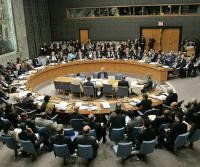Like beauty, the value of the United Nations lies in the eye of the beholder. Case in point, David Rothkopf's recent screed on ForeignPolicy.com against the world's largest multilateral organization, the latest in a long line of vitriolic -- and largely misinformed -- attacks on the institution.
Only a few years ago, John Bolton, at the time the U.S. ambassador to the body, declared that lopping 10 floors off the secretariat would make little difference in its operation. Superfluous or not, those 10 floors managed to survive Bolton's U.N. tenure largely unscathed. Although Rothkopf's rant, too, will likely dissolve away into the digital archives of misguided foreign policy analysis, his argument deserves a second, serious look.
That Rothkopf should be the source of this broadside is unfortunate, because he otherwise seems to be, on the whole, brilliant. His credentials are top-notch: head of a global consulting firm, appointment to the Carnegie Endowment for International Peace, author of the enjoyable read, "Superclass" (which drilled into the networked elite pulling the powerful levers behind the machinery of globalization) and another widely praised book
on the National Security Council.

